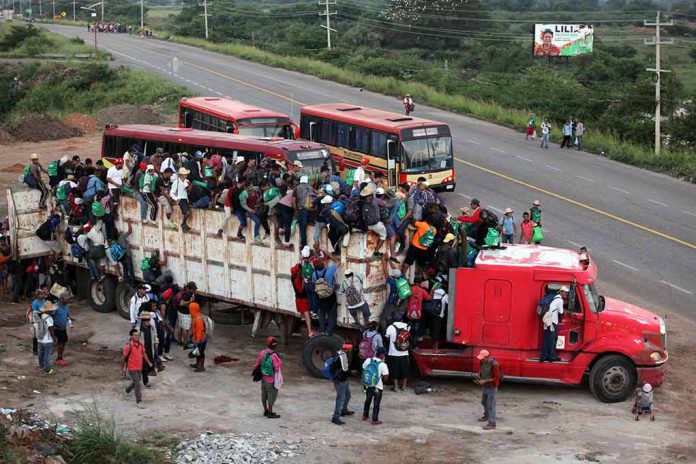
Rajinder Singh’s recent confession has unraveled a human smuggling operation that transported over 500 Indian nationals across the U.S.-Canada border, raising concerns about international immigration policies and migrant safety.
At a Glance
- Two men, Harshkumar Ramanlal Patel and Steve Anthony Shand, are on trial for allegedly smuggling an Indian family, leading to their deaths.
- The Patel family perished in a blizzard near the U.S.-Canada border in January 2022.
- The smuggling network orchestrated illegal entry from Canada into the U.S. using student visas.
- Rajinder Singh transported over 500 Indian migrants and earned more than $400,000.
Central Figures in a Tragic Scheme
Harshkumar Ramanlal Patel and Steve Anthony Shand stand accused in a tragic human smuggling trial. The charges stem from an attempt to smuggle the Patel family, resulting in their deaths during a severe winter storm near the border. The family, who had initially traveled from India to Canada on visitor visas, was found frozen just 12 meters from the U.S. border, underscoring the lethal risks associated with these crossings.
The smuggling network exploited legal loopholes, using fraudulent student visas to bring Indian nationals to Canada, and subsequently arranged their illegal entry into the U.S. Witnesses described extreme conditions during the Patel family’s fateful journey, with temperatures plummeting to minus 30 Fahrenheit. As the trial unfolds, Singh’s testimony against Patel and Shand is pivotal, particularly his claim of a network geared for profit at the expense of human lives.
A convicted human smuggler from India who testified during the trial of two men charged in the death of a migrant family, said he shuttled hundreds of Indian migrants across the U.S.-Canada border.https://t.co/tkYYxYf3no
— Border Report (@BorderReportcom) November 21, 2024
Laying Bare the Smuggling Network
Singh’s candid admission places a spotlight on the intricate web of human smuggling. He confessed to making over $400,000 from his illegal activities, using “hawala,” an informal money transfer system, to facilitate transactions across borders. Migrants, desperate for a new life, reportedly paid $100,000 to be transported from India to the U.S. This network capitalized on people’s vulnerabilities, as some smuggled migrants were coerced into working for low wages in U.S. restaurants to repay their debts.
The trial seeks to unravel this extensive network, which extends back to illegal immigration agents in India and smugglers in North America. Two Indian nationals were recently arrested in Gujarat concerning these operations, emphasizing the international ramifications of Singh’s testimony. Singh’s cooperation with authorities reflects a decisive shift in focus. The agreement allows him to remain in the U.S., underscoring a significant compromise aimed at dismantling this network’s hierarchy.
Navigating Through Judicial Processes
Legal proceedings continue as Shand’s attorney asserts his client’s innocence. The defense argues that Shand was unknowingly involved, while prosecutors present evidence of his payments from Patel. The ongoing trial promises to deliver more insights into the operations and the responsibilities of the individuals involved. Singh’s haunting recollection of a “screwed up” operation, punctuated by the devastating outcome for the Patel family, solidifies his role in the prosecution’s case.
“Our work got screwed up. People got caught,” said Singh’s smuggling associate.
The unraveling of this operation through Singh’s testimony aims to halt a network that has long exploited hope at a high cost. This case is a stark reminder of the lethal stakes involved in human trafficking, highlighting humanity’s relentless pursuit of a better life regardless of the risks. As this story unfolds, it serves as a reminder of the consequences and responsibilities associated with illegal migration.






















